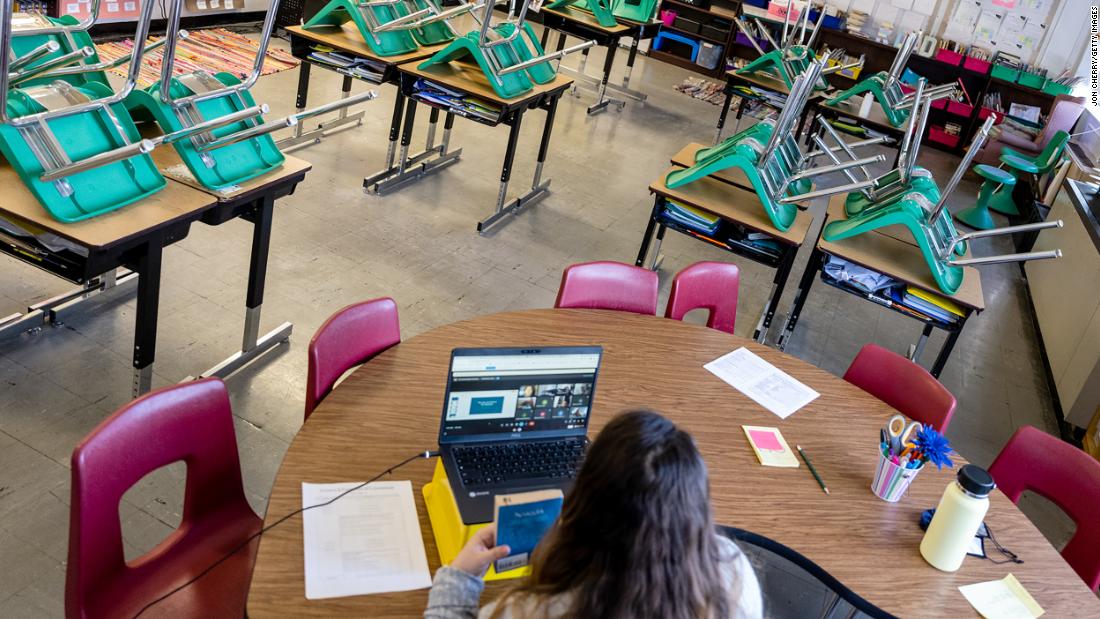
A majority of voters (59%) said the economy will be extremely important to their congressional vote this year, 55% said the same of inflation, and 49% on taxes. Concern about the economy hasn’t been this widespread in any midterm-year CNN Poll dating back to 2002 and only reached similar levels in the summer of 2010 (56%).
Voting rights also emerged as a priority in the latest survey, with 55% calling them extremely important. Even though the field dates of the poll overlapped with the tail end of the Omicron variant, a relatively low 38% of respondents cited the coronavirus pandemic as extremely important to their midterm vote.
There are notable partisan differences. Republican and Republican-leaning voters were most united in seeing inflation (69%) and the economy (68%) as key issues, with 60% also calling immigration important, while Democratic and Democratic-leaning voters gravitated most toward voting rights (65%) and health care (60%). The biggest partisan gap comes on climate change: Democratic-aligned voters were about 5 times likelier than GOP-aligned voters to call it extremely important, 52% to 10%.
Twenty-four percent of voters said they were extremely enthusiastic about voting in this year’s midterms, identical to the enthusiasm levels in February 2018. But in a reversal from four years ago, it’s the GOP that now leads in enthusiasm — 30% of Republican and Republican-leaning voters were already expressing extreme enthusiasm, compared with 22% of Democratic and Democratic-leaning voters.
Voters were close to evenly split in their preferences between the two parties, the poll found. Forty-four percent said they preferred to vote for a Republican candidate and 43% said the same for a Democratic one, similar to responses in CNN’s polling last summer. Forty-one percent said the country would be better off if Republicans took over Congress, while 36% said it would make things worse. Twenty-two percent said it’d make no difference.
By a 10-point margin, 42% to 32%, voters said they preferred a congressional candidate who opposes President Joe Biden to one who supports him, with the rest saying they didn’t have a preference. By a wider 17-point margin, 44% to 27%, voters also said they preferred a candidate who opposes former President Donald Trump rather than one who backs him. Two-thirds of Democratic and Democratic-leaning voters saw a candidate’s support for Biden as an asset (68%), while a more modest 53% of Republican and Republican-leaning voters said the same of Trump.
Polls represent single snapshots in time, and with America just emerging from an unprecedented Covid-19 wave, it’s a particularly volatile moment. The results can’t predict what the political environment or electorate might end up looking like this fall, or what issues will be at the top of voters’ minds. Even when voters agree that a particular issue is important, they’re often approaching it from very different angles.
Attitudes toward education — an issue that emerged as a flash point in 2021 gubernatorial races in both Virginia and New Jersey — are a good example: 46% of voters, including about half of parents with children younger than age 18, said education will be extremely important to their vote for Congress this year. Half of Democratic-aligned voters (50%) and 42% of Republican-aligned voters call the issue highly important.
When those who said education was extremely important to their vote were asked why, their answers covered a broad array of concerns. The biggest share, 31%, said it was because of the broad social benefits of education rather than any recent political controversy. A quarter said education was an important issue because of the school curriculum or content, including about 7% who specifically named the concept of “critical race theory” or how history is taught, and 1% who expressed concerns about Republican-led efforts to shape curricula.
Among other reasons, 6% mentioned the pandemic, including 3% who raised concerns about students falling behind, 2% who mentioned in-person learning, and 1% who referenced school masking
But views on what makes education itself important were also split by party. Republicans and Republican-leaning independents who are focused on education as a midterm issue were more likely than Democrats and Democratic leaners to name curriculum or school quality as an issue (33% vs. 16%), while Democratic-inclined voters were more focused on school funding and costs than their GOP counterparts (21% vs. 6%).
While parental choice has become the subject of frequent political controversy, the CNN Poll found that most Americans reject the idea that the primary responsibility for what happens in the classroom belongs either to parents or to teachers and school officials. Majorities said both groups should have an equally important role in school-related decisions ranging from Covid-19 precautions to the way various school subjects are taught.
There’s variation here too, depending on the issue in question. Only about one-fifth of Americans (19%) said parents should be the main decision-makers on mask policies, with 17% saying the same about virtual learning and 16% on teaching about racial issues. Just 7% thought parents should have final say over how to teach math.
Opinions on the policies that have been most frequently in the news recently land largely in the middle. About 1 in 8 Americans, or 12%, said parents’ views should have the most sway over which library books are on the shelves and how American history is taught, while roughly twice as many said teachers and school officials should have more influence on those areas. Respondents split equally over how issues regarding race in America are taught, with 16% saying parents should have more say, 16% teachers and school officials, and 62% saying both should be equally important.
The CNN Poll was conducted by SSRS January 10 through February 6 among a random national sample of 1,527 adults initially reached by mail, and is the second survey CNN has conducted using this methodology. Surveys were either conducted online or by telephone with a live interviewer. Results for the full sample have a margin of sampling error of plus or minus 3.3 percentage points.



